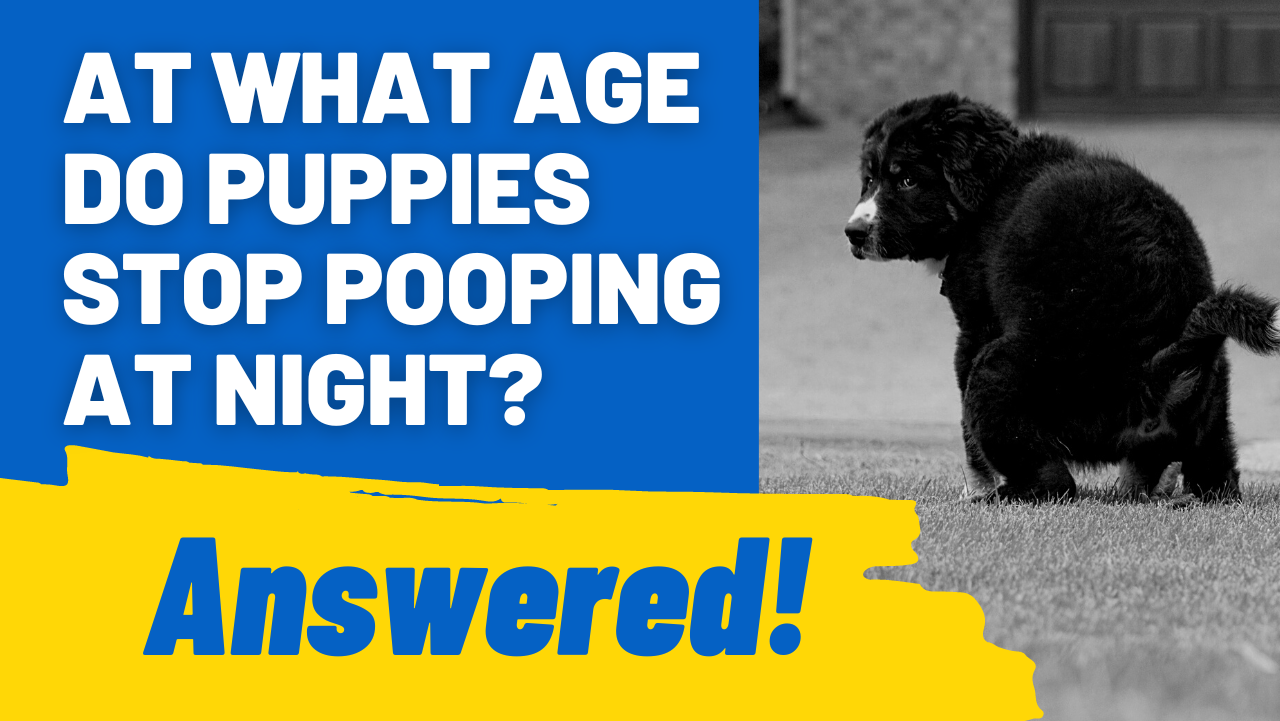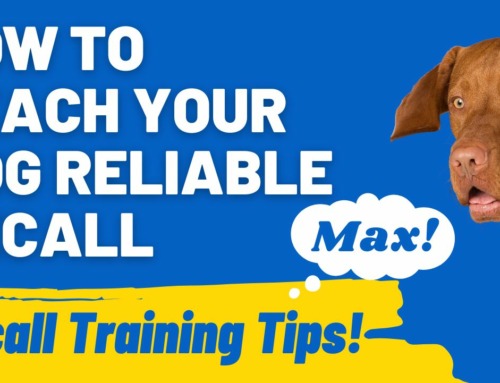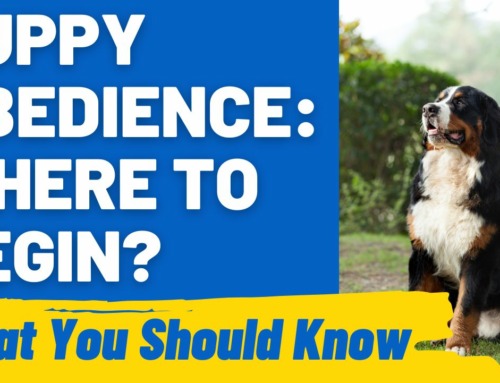The one thing that owners arguably dislike most about owning a puppy is the house-training. Especially when it means having to get up at all hours of the night to let your puppy out for a poop! But at what age do puppies stop pooping at night and how can you speed up the process?
Healthy puppies usually stop pooping at night when they’re near the 10-month mark. That’s when they can control their bladders and bowels better and can wait till morning. This period can take more or less time depending on the size of your dog and how effective your training is.
In the first six months of your puppy’s life, they’ll need to poop during the night, so it’s your job to ensure that this poop is outside the house.
The important thing to know is this: a puppy can hold their poop for as many months as they are old. For bladder control, it’s as many months as they are old, plus one.
Food will generally take 4-6 hours for a puppy to digest – the smaller and younger they are, the faster it will be. So let’s say your puppy has something to eat for dinner at 7.30pm. Then you put them to bed in their crate for the night at 9.30pm. If your pup is 4 months old, they will need to poop within 4 hours. So by 11.30pm your pup will need to poop.
If your pup doesn’t evacuate all their bowels in this movement, it’s likely that within another 3-4 hours they will need to poop again. Something like 3.30am.
This is why it’s vital that you let your pup out for a poop before bedtime to give you the best chance for a longer sleep. This will give you the most amount of hours of sleep before they need you to take them out for a poop.
Here is a chart to show you how long your puppy can hold their poop at night:
| Age of Puppy | Hours Bowel Control | Hours Bladder Control |
|---|---|---|
| 1 month | 1 hour | 2 hours |
| 2 month | 2 hours | 3 hours |
| 3 month | 3 hours | 4 hours |
| 4 month | 4 hours | 5 hours |
| 5 month | 5 hours | 6 hours |
| 6 month | 6 hours | 7 hours |
| 7 month | 7 hours | 8 hours |
| 8 month | 8 hours | 9 hours |
Should My Puppy Be Pooping in the Night?
Your puppy will naturally need to poop at night because they have a small bowel and need to empty it often. The smaller the dog, the more likely they’ll need to empty their bowel regularly.
It’s also worth noting that a pup doesn’t have full bladder or bowel control for the first 16 weeks of their life, and their pooping and peeing will often work together. And pup’s do pee a lot! Here’s an article you might like to read about that, Puppy Peeing a Lot: 5 minutes, 10 minutes, What is Normal?
Of course, your goal is to make your puppy hold their poop until the morning, but depending on their age, this can be an impossible task for them.
Generally, it takes puppies between 4-6 hours to digest their food, after which they may find it difficult to hold it in.
It’s also worth noting that accidents are still liable to happen here and there, but you should be patient enough and help your puppy as they grow and understand potty breaks.
You might like to read our post, Puppy Won’t Poop Outside: Here’s What to Do
When Can Dogs Hold Their Poop All Night?
Providing that dogs are healthy and parasite-free, dogs can hold their poop all night starting from the 8-month mark. Around that age, your dog will be able to hold it in for 8 hours, which is roughly the whole night. However, 12 months old is when the potty training is complete, and all the habits you taught your dog have settled in.
A dog can revert to pooping inside at night if they are anxious or fearful about going outside, if they have a medical issue, or if their poop inside hasn’t been properly cleaned with an enzymatic cleaner.
At What Age Do Puppies Stop Pooping in the House?
There’s no specific age at which dogs stop pooping in the house, as that depends on how you handle your puppy at night, and how early and effective the potty training is.
However, the usual range is usually between 8–12 months. That’s when your puppy would have learned to take full control of their bladder.
We’ll discuss the steps of proper potty training in a moment, but for now, know that as you continue to take your puppy outside for potty breaks, they will learn that pooping is to be done outside the house.
You may start potty training your puppy around the 8-week mark. You have until the 16-week mark to begin potty training, after which it becomes increasingly difficult as your puppy grows up.
However, until the potty training begins, you’ll rely on a nighttime puppy relief schedule.
How Do I Stop My Puppy From Pooping in the House at Night?
Now for the important part, here are the things you should do to reduce (and hopefully prevent) nighttime pooping accidents:
1. No Food or Drinks Before Bedtime
Even we, adult humans, will wake up in the middle of the night if we go a little heavy on food before bed. Regardless of how tired you are, if your bladder is too full, it’ll wake you up.
Luckily, we can simply walk to the bathroom, which isn’t the case for your puppy inside his crate.
So, ensure that your puppy’s last meal is at least five hours before bedtime.
2. Take Your Puppy Out Before Sleep

You should take your puppy outside for their potty break before you put them back in their crate or kennel. Relieving themselves before bedtime will reduce the chances of nighttime accidents.
It’s best to have a specific command for potty time. “Go” or “Do it” are quick and easy ones that your puppy can recognize. We say “Wees and poos!”
Familiarize your puppy with these commands by saying them every time you take him out for the bathroom break.
Have a treat ready as a reward whenever your puppy follows the command, as this will help him associate the command with the go time.
Be warned, it may be frustrating if your pup takes a long time to do their poop in the middle of night, and you want to get back to sleep!
3. Play With Your Puppy at Night
It’s always nice to play with your puppy, but it can be of extra benefit at night. When an exhausted puppy goes to sleep, they’ll be less likely to wake up through the night.
Pair this with step two, and your puppy will have less probability of leaving an unpleasant surprise in their crate at night.
4. Wake Up Before Your Puppy Wakes You Up
Unfortunately, even if you do everything right, your young puppy would still need to go out at night. The frequency of those midnight breaks will gradually reduce as your puppy grows and learns to hold it in. However, until then, you’ll have to wake up. Ugh!
Here, you’ll have one of two choices; either wake up before your dog and wake them up to go outside, or wait until they cry in their crate.
The latter choice isn’t at all recommended because of two reasons. One, you’ll hate being forced up to do something, and two, your puppy will associate throwing a tantrum with getting what they need.
So, you should probably set a specific time to wake up in. Time the last meal your puppy ate with the average digestion time and how long can your puppy hold it, and you’ll know when to set the alarm.
For example, if your puppy is one month old and he ate at 8:00 pm, then he’d need the bathroom six hours later around 2:00 am. Since he’s one month old, he can hold for one extra hour, so you should wake up and take your puppy out before 3:00 am.
5. Ensure That Your Pup Is Healthy
Your puppy should gradually learn to control themselves before needing to go. However, some health issues might prevent them from doing that.
If you’re noticing little to no progress in your puppy’s ability to control their bladder, they could be suffering from a medical problem.
Intestinal parasites and pancreatitis are common health problems that increase your puppy’s need to use the bathroom. If you suspect something, have your puppy checked by a vet.
6. Use a crate
If you’re not doing so already, make sure you use a crate at night. It’s the best way to train a pup to hold their bladder and bowel as they don’t like to use the toilet in their close vicinity.
You might like to read our post if you have this question: Is it Cruel to Crate a Dog at Night? (Yes or No)
At What Age Are Most Puppies Housetrained?
On average, we consider puppies to be fully housetrained around 4–6 months of age. Some factors like the size and the breed can slightly increase that period.
For example, smaller breeds tend to have less control over their bladders. These little nuggets might be bothersome during potty training since their metabolism is usually faster than larger breeds.
Transitioning From Midnight Poop to Morning Poop
Now that you understand that pooping at night is normal at first, it’s time to put it all together and teach your puppy how to wait until the morning. Here are some tips to do so:
Progressive Delay
Add 10 minutes to your alarm clock every time you wake up to take your puppy out. Those extra 10 minutes will gradually give your puppy a longer waiting time until he can transition to a full night’s sleep.
Don’t worry, your puppy is growing, and so is his ability to hold it in, so you should be fine.
Don’t Play With Your Puppy During the Midnight Break

As harsh as this sounds, you shouldn’t play with your puppy when you wake him for his midnight bathroom break. Otherwise, he’ll be excited about that time and even anticipate it, which is the opposite of a full night’s sleep.
Don’t play or interact with your puppy too much. Just take him out, give him the go command, then bring him back to his cage.
Adapt to Your Puppy’s Schedule
The numbers we mentioned above are expected timelines, but they’re not obsolete. If your dog isn’t progressing as fast as you want him to, don’t snap at him, or you’ll make it worse.
Make sure to visit the vet to rule out any health issues and be patient with your puppy.
In Summary
Young puppies have to wake up at night for bathroom breaks. That’s something you can’t control. What you can control is to take that poop outside, not inside.
So, wake up before your puppy and gradually add small intervals of time until your puppy gets used to pooping in the morning.
The growth of your puppy paired with the efficiency of his potty training will control how fast that transition goes.




